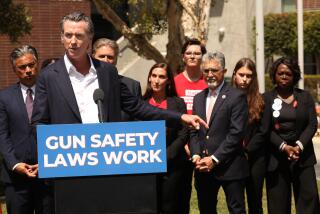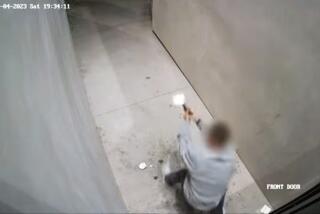Roberti Aide’s Weapon Permit Opens Wound
SACRAMENTO — An assistant to Senate leader David A. Roberti, the Legislature’s champion of firearms controls, was issued a license Thursday by local authorities allowing him to carry a concealed revolver in the gun-shy Capitol and nearly anywhere else in California.
Issuance of the permit to David L. Commons, 77, caused consternation in the office of the Los Angeles Democrat. Clearly irritated, Rules Committee executive officer Cliff Berg, Roberti’s longtime No. 1 aide and Commons’ boss, said Commons acted on his own and did not consult his superiors in advance.
Commons, a Capitol insider who has developed friendships in police unions and other law enforcement organizations, was granted the permit by senior officers of Sacramento County Sheriff Glen Craig. Commons claimed that because of his age and 5-foot-5, 230-pound build, he was a natural target for muggers and needed protection.
“I am doing what every citizen has a right to do by the Constitution . . . and that is exercise the right to protect myself,” Commons said in an interview. “I describe myself as the shortest, fattest, oldest guy around. I am probably the classic type that muggers go after.”
A frustrated Berg asked rhetorically: “Is he different from, say, 80 other Senate employees who are highly visible, who have (his) various criteria? . . . Is the Sacramento sheriff going to be handing out permits en masse to employees who feel that way?”
” . . . I am not disagreeing with anything he put in his application, but it is a personal request on his part,” said Berg, who learned of the application a few weeks ago. “He is not acting as a Senate employee. It has nothing to do with his official duties.”
Whether the gun permit flap will affect Commons’ status on the Roberti staff was not known. Roberti was not immediately available for comment.
Roberti has been at the center of virtually every gun control fight in the Legislature for years, always endorsing tighter restrictions. In the Senate, he led the successful 1989 battle to make California the first in the nation to outlaw military-style assault weapons.
Ever since armed Black Panthers invaded the Assembly chamber in 1967, legislators and security officials have been highly sensitive to the presence of guns in the Capitol. Because of the invasion, a whole series of special Capitol gun control laws were enacted, including a ban on loaded firearms, except those of peace officers and people with permits for concealed weapons.
Commons, a former film executive and political consultant, has worked as a volunteer and a paid staff member for Roberti for about 11 years in Sacramento. Commons also is a generous contributor to political campaigns, an oddity for a legislative staffer. Public records show that since 1985 he has given more than $20,000 to Democratic and Republican candidates.
In his $76,300-a-year job, Commons acts as staff contact with police unions and other peace officer groups and gets involved in what he described as “operational details of sensitive ongoing activities.”
In his application for a permit to carry a .38-caliber Smith & Wesson handgun, Commons told the sheriff that these facts, along with his age and late working hours, put him at “substantial” personal risk.
It is unknown how many legislators or their staff members are licensed to carry concealed weapons, although a law enforcement source estimated the number at fewer than six. The Legislature’s first line of security, its sergeants at arms, are not armed.
In recent years, many sheriffs and police chiefs have drastically cut back on concealed-weapons permits in the belief that the more firearms on the streets, the higher the risk of accidental or deliberate shootings. Likewise, sheriffs and police chiefs say they are tired of dealing with charges that they had provided the licenses to political friends. This year, 436 such permits were issued in Sacramento County, compared to 2,000 in 1975.
State law requires only that the applicant show “good cause” for carrying a concealed gun, and empowers local sheriffs and police chiefs to determine who will get permits.
More to Read
Get the L.A. Times Politics newsletter
Deeply reported insights into legislation, politics and policy from Sacramento, Washington and beyond. In your inbox three times per week.
You may occasionally receive promotional content from the Los Angeles Times.










